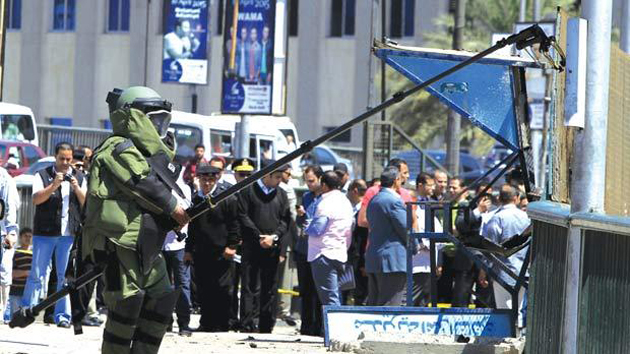Coptic Church was attacked on Sunday. “Almost every day new bombs are found in Cairo”, says a Christian living in the capital.
 A bomb detonation expert working in Egypt some days ago. / Reuters
A bomb detonation expert working in Egypt some days ago. / Reuters
Last Sunday night (Palm Sunday in the Coptic calendar), Islamist militants in a microbus shot at the Church of the Angel Rafael in Alexandria, wounding a police officer and three civilians, before fleeing, security sources said.
The night attack on the church came after the founder of terrorist group Ajnad Misr (emerged in January 2014) was killed in a police shoot out in Egypt’s Giza, announced the spokesperson of the Egyptian Ministry of Interior.
The terrorist had claimed responsibility for numerous bombings in Egypt, including one in central Cairo in 2014. Police say Ajnad Misr has been involved in 26 terror incidents.
“YOU NEVER KNOW WHEN THE NEXT BOMB IS GOING TO EXPLODE”
This latest event is only one more in a long chain of events, which are making Christian believers in Egypt feel nearly as insecure as in other recent periods in the country.
An evangelical Christian living in Cairo told Evangelical Focus 3 weeks ago: “I personally even feel sometimes a bit worried as you never know where and when the next bomb will explode”.
“Some days ago, ten bombs were found and one even exploded, all the bombs were found in the part of the city were I live… Almost every day now some new bombs are found all over Cairo.”
Most attacks target key government buildings.
Despite the beheading of 21 Egyptians in Lybia, the real Islamist threat inside Egypt are Islamic Militants who support the Muslim Brothers, “as they still don’t accept the fact that Morsi is not their president anymore and that he got thrown over by Abdel Fattah el-Sisi”.
This believer asks “Christians to pray for the protection of the people here.”
PRESSURE ON CHRISTIANS IN RURAL EGYPT
Far from the capital, persecution against Christians is not carried out by terrorist groups, but by their own neighbours. In villages like al-Our and el-Galaa, Coptic Christians cannot live out their faith, and been prevented from building a church by a mob and security forces.
“In early March a mob physically attacked”, writes Hudson Institute’s Center for Religious Freedom Samuel Tadros in an article published in National Review magazine.
“In what has become a common practice, [Muslim locals] also issued a number of demands: The church was to have no outer symbol of Christianity — no dome, no cross, no tower, no bell — and its entrance was to be on a side street”.
Some days later, “some local Muslims threw rocks at a bus carrying Christian girls. The violence quickly spread. Rocks were thrown at Christian homes, and some shops owned by Christians were looted. Seven Copts were wounded in the attack.”
Instead of punishing the violence, authorities usually respond to the attacks by trying to start negotiations with both the Muslim attackers and the Christian victims. This leaves the violent groups with a feeling that their actions against Christians will not be stopped by the government, and that their pressure will grant that some of their intolerant demands are approved by local authorities.

Las opiniones vertidas por nuestros colaboradores se realizan a nivel personal, pudiendo coincidir o no con la postura de la dirección de Protestante Digital.
Si quieres comentar o